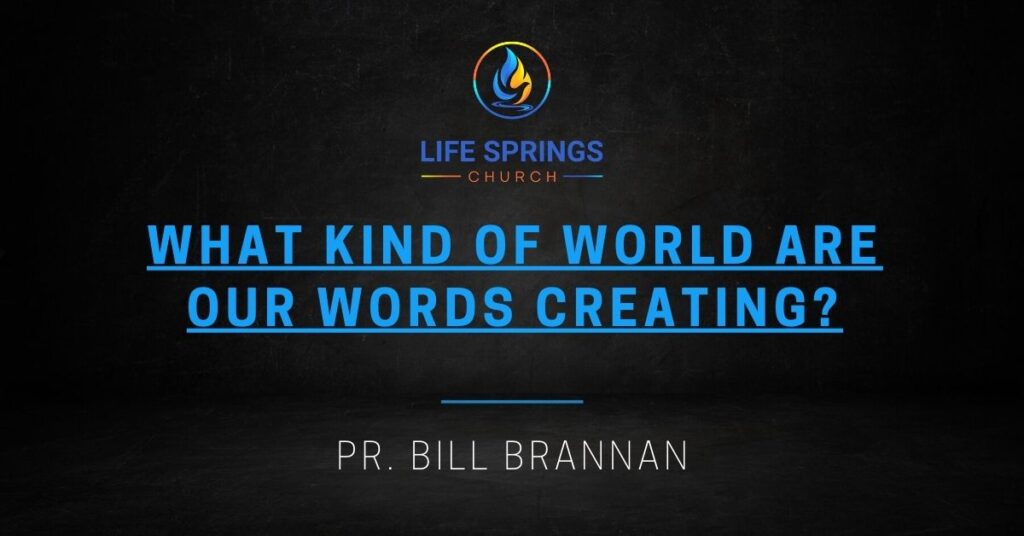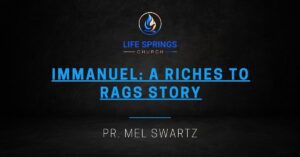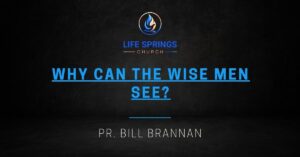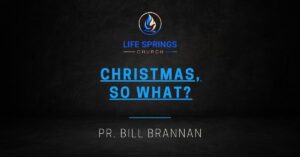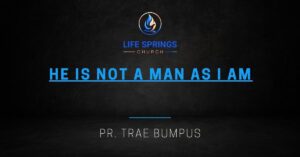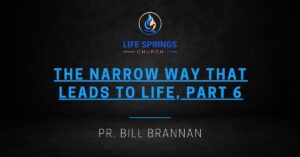The First Question God Will Ask: A Deep Dive into Faith and Integrity

In this thought-provoking sermon, Pastor Bill Brannan explores the profound implications of how we conduct our lives, particularly in business, as he posits that the first question we may face from God is not about our religious practices, but our integrity. This blog will delve into the teachings shared and how they challenge conventional beliefs about faith, judgment, and the transformative power of God’s word.
Words Creating Our World
Our words hold immense power. They shape our reality and influence those around us. Every conversation, every statement we make contributes to the world we create. The biblical principle that “life and death are in the power of the tongue” resonates deeply with this idea.
Words can uplift or tear down, inspire or discourage. In business, for instance, the integrity of our communication can establish trust or breed suspicion. As we navigate through life, we must be mindful of the language we use and the impact it has on our environment.

Photo by Christian Buehner on Unsplash
Creating a Culture of Honesty
When we choose to speak truthfully, we foster a culture of honesty. This culture is essential not only in personal relationships but also in business practices. Honesty builds a foundation for trust, which is crucial for any successful endeavor.
- Encouraging Transparency: Open communication encourages transparency among colleagues and clients.
- Building Relationships: Honest interactions lead to stronger relationships built on mutual respect.
- Promoting Accountability: A culture of honesty promotes accountability, ensuring that everyone takes responsibility for their actions.
By being intentional with our words, we can contribute to a world that reflects honesty and integrity.
Judgment Day Questions from God
As we ponder the nature of our lives and the legacy we leave behind, we must consider the profound questions we might face on Judgment Day. The first question, as suggested, revolves around our integrity in business dealings. This inquiry transcends mere religious observance.
God may not ask about our church attendance or the number of prayers we recited. Instead, He may inquire about our actions in the marketplace and how we treated others in our business practices. This perspective shifts our focus from ritualistic faith to authentic living.

Photo by Thomas Bjornstad on Unsplash
Reflecting on Our Actions
To prepare for such a moment, we must engage in self-reflection. Here are several questions to consider:
- Did I act with integrity in my business dealings?
- How did my actions reflect my faith?
- Did I prioritize profit over people?
These questions challenge us to evaluate our priorities and the true motivations behind our actions. They urge us to align our business practices with our values.
Scribes and the Kingdom of Heaven
In Matthew 13:52, Jesus speaks of scribes instructed in the Kingdom of Heaven. These scribes play a pivotal role in interpreting and sharing God’s word. Their ability to draw from both old and new treasures enriches our understanding of scripture and its applications in our lives.
Understanding the context of biblical teachings is essential. Scribes were not merely record-keepers; they were educators who influenced the spiritual and moral fabric of their communities.
The Role of Scribes Today
Today, we need modern-day scribes who can bridge the gap between ancient wisdom and contemporary challenges. Their role includes:
- Teaching Biblical Principles: Scribes educate others on the importance of biblical values in everyday life.
- Contextualizing Scripture: They help contextualize scripture for modern situations, making it relevant and applicable.
- Inspiring Faith: By sharing their insights, they inspire others to deepen their faith and commitment to God’s word.
In this way, the legacy of the scribes lives on, encouraging us to draw from the depth of God’s wisdom.
Conducting Business Honestly
Honesty in business is not merely a moral choice; it is a foundational principle that leads to long-term success. When we conduct our business with integrity, we establish a reputation that attracts clients and partners.
Ethical business practices reflect our faith and commitment to a higher standard. They demonstrate that we value people over profits, creating a positive impact in our communities.

Photo by Adeolu Eletu on Unsplash
Principles of Honest Business Practices
To ensure honesty in our business dealings, we can adopt the following principles:
- Transparency: Be open about policies, pricing, and practices.
- Fairness: Treat all clients and employees with fairness and respect.
- Accountability: Take responsibility for mistakes and learn from them.
By embodying these principles, we not only honor our commitments but also reflect our faith in action.
False Messianic Movements
Throughout history, false Messianic movements have emerged, often promising solutions to societal problems but delivering devastation instead. These movements arise from genuine needs but misinterpret the path to fulfillment.
For instance, communism offered a vision of equality but resulted in tyranny and oppression. This serves as a reminder that well-intentioned solutions can lead to disastrous outcomes when they stray from biblical principles.

Photo by Samantha Sophia on Unsplash
Recognizing the Right Solutions
To avoid falling into the traps of false solutions, we must seek answers rooted in biblical truth. Here are some steps to identify the right solutions:
- Evaluate the Source: Assess whether the proposed solution aligns with God’s word.
- Consider the Outcomes: Reflect on the potential consequences of the solution.
- Seek Wisdom: Engage with spiritual leaders and mentors for guidance.
By grounding our decisions in scripture, we can discern the right path and avoid the pitfalls of misguided movements.
Importance of Having the Right Answer
In a world filled with competing ideologies and solutions, having the right answer is crucial. The church’s role is to provide clarity and direction based on biblical truths. When we stray from this foundation, we risk perpetuating confusion and division.
As believers, we must strive to understand and articulate the truth of God’s word. This will enable us to respond effectively to the challenges we face in our culture.

Photo by Jack Sharp on Unsplash
Engaging with Complex Issues
Addressing complex issues requires thoughtful engagement and a commitment to truth. Here’s how we can approach these discussions:
- Listen Actively: Understand different perspectives before responding.
- Seek Biblical Guidance: Turn to scripture for wisdom and clarity.
- Promote Dialogue: Encourage open conversations that foster understanding.
By engaging thoughtfully, we can provide the right answers that reflect God’s heart and truth.
Church’s Cultural Impact
The church has historically played a vital role in shaping culture. From advocating for justice to promoting moral values, the church’s influence is profound. However, this impact has waned in recent years, necessitating a renewed commitment to cultural engagement.
As believers, we must actively participate in cultural discussions and demonstrate the relevance of our faith in everyday life. This includes addressing societal issues with compassion and integrity.

Photo by Priscilla Du Preez 🇨🇦 on Unsplash
Reclaiming Our Influence
To reclaim our influence, the church can focus on the following strategies:
- Empower Members: Equip congregants to engage in their communities.
- Promote Service: Encourage acts of service that reflect Christ’s love.
- Foster Collaboration: Work alongside other organizations to address common goals.
By doing so, we can restore the church’s cultural impact and fulfill our mission to be salt and light in the world.
Believers’ Children Falling Away
One of the most pressing concerns in the modern church is the alarming trend of believers’ children falling away from their faith, particularly when they transition to college. This issue requires a multifaceted examination. Too often, children are indoctrinated with beliefs based solely on authority rather than fostering a personal understanding of their faith.
This approach creates a fragile foundation. When these young people encounter opposing viewpoints in a university setting, they may struggle to defend their beliefs, leading to disillusionment. The solution is not to isolate them but to engage them in meaningful discussions that allow them to explore their faith critically.

Photo by Alexis Brown on Unsplash
Building a Stronger Foundation
To combat this trend, we must focus on building a stronger foundation for our children. Here are some strategies:
- Encourage Critical Thinking: Teach children to question and explore their beliefs rather than accepting them blindly.
- Foster Open Dialogue: Create an environment where discussions about faith are welcomed, allowing them to express doubts and curiosities.
- Model Authentic Faith: Demonstrate a genuine and vibrant faith that they can aspire to emulate.
By nurturing a personal relationship with God, children are more likely to carry their faith into adulthood.
Leaders and Sin
The issue of church leaders falling into sin has created significant challenges within the body of Christ. When a leader stumbles, it can lead to widespread disillusionment among their followers. This pattern suggests deeper systemic issues within church structures and leadership models.
We often elevate leaders to a status that makes them seem untouchable, forgetting they are human, subject to the same struggles as everyone else. This disconnect can lead to unrealistic expectations and a lack of accountability.

Photo by Kyle Smith on Unsplash
Reevaluating Leadership Structures
To address these issues, we must reevaluate how we structure and view leadership within the church:
- Promote Accountability: Establish systems where leaders are held accountable for their actions, fostering transparency.
- Encourage Vulnerability: Leaders should be encouraged to share their struggles, creating a culture of honesty and support.
- Focus on Community: Encourage leaders to build real relationships within their congregations, ensuring they are not isolated in their roles.
By fostering a culture of accountability and support, we can help prevent leaders from falling into sin and encourage a healthier church environment.
Restoring the Church’s Inheritance
The church has an incredible inheritance that has been neglected over the years. This inheritance includes the rich teachings of the Old Testament, which provide a foundation for understanding God’s character and His plans for humanity. To restore this heritage, we must prioritize teaching these truths in our congregations.
Our founding fathers drew from these biblical principles when establishing the values of our society. By reconnecting with these roots, we can reclaim our identity as a church and fulfill our God-given purpose.

Photo by Debby Hudson on Unsplash
Strategies for Restoration
To restore the church’s inheritance, consider the following strategies:
- Integrate Old Testament Teachings: Teach the Old Testament alongside the New Testament to provide a holistic understanding of God’s plan.
- Engage in Historical Reflection: Study the historical context of biblical teachings to appreciate their relevance today.
- Encourage Intergenerational Dialogue: Foster conversations between generations to share insights and wisdom from the past.
By actively engaging with our spiritual heritage, we can restore the transformative power of the church in today’s world.
Vision for the Future
As we look to the future, we must cast a vision that aligns with God’s heart for humanity. This vision should be rooted in love, dignity, and the pursuit of justice. The church is called to be a beacon of hope, demonstrating what is possible when we live according to God’s principles.
We must dream of a world where God’s love reigns, and His justice is evident in our communities. This vision is not merely aspirational; it is achievable through the power of the Holy Spirit working in us.
Steps Toward a Brighter Future
To realize this vision, we can take several practical steps:
- Empower the Next Generation: Equip young believers with the tools they need to carry the faith forward.
- Engage in Social Justice: Actively participate in addressing societal issues through love and service.
- Foster Unity: Work alongside other believers to create a united front for the gospel.
By taking these steps, we can move toward a future that reflects God’s kingdom on earth.
Insights from Isaiah 58
Isaiah 58 presents a powerful call for the people of God to engage in acts of justice and mercy. The passage emphasizes that true fasting is not merely about rituals but about actively working to alleviate the suffering of others. God desires a people who reflect His heart through their actions.
This chapter challenges us to examine our priorities. Are we more focused on religious observance than on loving our neighbors? The answer to this question can have profound implications for our faith and witness.

Photo by Edwin Andrade on Unsplash
Applying Isaiah’s Message Today
To apply the insights from Isaiah 58, consider the following actions:
- Engage in Community Service: Find ways to serve those in need within your community.
- Pursue Justice: Advocate for those who are marginalized and oppressed.
- Live Out Your Faith: Let your actions speak louder than your words, demonstrating God’s love in tangible ways.
By embodying the principles found in Isaiah 58, we can become agents of change in our communities.
Gospel in the Old Testament
The gospel is not confined to the New Testament; it is woven throughout the Old Testament as well. From the promises made to Abraham to the prophecies of the Messiah, the Old Testament lays the groundwork for understanding the fullness of the gospel. Recognizing this connection enriches our understanding of God’s redemptive plan.
When we study the Old Testament, we see themes of grace, mercy, and redemption that point to Jesus Christ. This continuity reveals the depth of God’s love for humanity and His desire to restore us to Himself.

Photo by Aaron Burden on Unsplash
Exploring the Gospel’s Roots
To explore the gospel in the Old Testament, consider these approaches:
- Study Messianic Prophecies: Examine the prophecies that point to Christ and their fulfillment in the New Testament.
- Understand Covenantal Themes: Explore the covenants God made with His people and their significance for our faith today.
- Reflect on Stories of Redemption: Look at the narratives that illustrate God’s redemptive work throughout history.
By understanding the gospel’s roots, we can appreciate the richness of our faith more fully.
Gospel and the Tabernacle of David
The Tabernacle of David represents a significant aspect of worship and communion with God. It symbolizes a place where God dwells among His people, allowing for intimate relationship and worship. The New Testament echoes this theme, emphasizing that through Christ, we have access to God’s presence.
The rebuilding of the Tabernacle of David is not just a historical event; it is a prophetic vision for the church today. It calls us to restore authentic worship and fellowship with God, inviting others into this transformative experience.

Photo by Edwin Andrade on Unsplash
Rebuilding the Tabernacle Today
To rebuild the Tabernacle of David in our lives and communities, we can:
- Prioritize Worship: Make worship central to our gatherings, allowing for genuine encounters with God.
- Encourage Community: Foster a sense of belonging and connection within the body of Christ.
- Invite Others In: Share the message of the gospel with those who have yet to experience the love of God.
By focusing on these areas, we can create a space where the presence of God is felt and experienced, drawing others to Him.
Rebuilding the Altar of God
(Preaching Outline)
1) What kind of world are our words creating? We will visit that question at the end of this message.
a) I want to begin with a challenging statement that Rabbi Sacks highlights in his commentary on Deuteronomy:
b) The Talmud states that when we leave this life and arrive at the World to Come, the first question we will be asked will not be a conventionally religious one: “Did you set aside times for learning Torah?” Rather, it will be: “Did you act honestly in business?”[1]
c) He is highlighting an important conviction that develops as a person becomes immersed in all of scripture.
d) One of the problems we have is that Christianity often focuses so much on the New Testament that we lose the context and end up missing the target.
e) Jesus said: Matthew 13:52 (NKJV) — 52 (Then He said to them,) “Therefore every scribe instructed concerning the kingdom of heaven is like a householder who brings out of his treasure things new and old.”
f) (Holman Bible Dictionary) – SCRIBE Person trained in writing skills and used to record events and decisions. During the exile in Babylon educated scribes apparently became the experts in God’s written word, copying, preserving, and teaching it. Ezra was a scribe in this sense of expert in teaching God’s word. A professional group of such scribes developed by NT times, most being Pharisees. They interpreted the law, taught it to disciples, and were experts in cases where people were accused of breaking the law of Moses. [2]
g) The liberty, human dignity and blessings of Western Civilization are a direct result of this!!!
h) Here is the passage that inspired such a conviction in the Rabbis: Isaiah 1:21–23 (NKJV) — 21 How the faithful city has become a harlot! It was full of justice; Righteousness lodged in it, But now murderers. 22 Your silver has become dross, Your wine mixed with water. 23 Your princes are rebellious, And companions of thieves; Everyone loves bribes, And follows after rewards. They do not defend the fatherless, Nor does the cause of the widow come before them.
i) Isaiah’s warning is as timely now as it was twenty-seven centuries ago. When morality is missing and economics and politics are driven by self-interest alone, trust fails and society’s fabric unravels. That is how all great civilizations began their decline, and there is no exception.[3]
j) Biblical vs. non-biblical spirituality
k) When the form becomes the objective rather than the means to the objective.
l) Matthew 6:5 (NKJV) — 5 “And when you pray, you shall not be like the hypocrites. For they love to pray standing in the synagogues and on the corners of the streets, that they may be seen by men. Assuredly, I say to you, they have their reward.
2) A question I have been exploring personally is: “What happens when we implement wrong solutions to problems?”
a) False messianic movements
b) Can be well intentioned and even Christian – eg. Pilgrimages
c) When the word of the Lord is rare. – why we need scribes instructed in the Kingdom.
d) Here are some examples I have been exploring (they require complex discussion not simple answers):
i) The church is not having the transformative impact on culture as it has in the past or is described in scripture.
ii) The children of believers falling away in college.
iii) Many believers not involved in a local church.
iv) The church suffering from leaders falling into sin.
e) This message is part of a discussion on the first one. In fact, all of the others could be categorized as part of that same discussion.
3) The vision
a) Isaiah 2:2–4 (NKJV) — 2 Now it shall come to pass in the latter days That the mountain of the Lord’s house Shall be established on the top of the mountains, And shall be exalted above the hills; And all nations shall flow to it. 3 Many people shall come and say, “Come, and let us go up to the mountain of the Lord, To the house of the God of Jacob; He will teach us His ways, And we shall walk in His paths.” For out of Zion shall go forth the law, And the word of the Lord from Jerusalem. 4 He shall judge between the nations, And rebuke many people; They shall beat their swords into plowshares, And their spears into pruning hooks; Nation shall not lift up sword against nation, Neither shall they learn war anymore.
b) Zechariah 2:1–5 (NKJV) — 1 Then I raised my eyes and looked, and behold, a man with a measuring line in his hand. 2 So I said, “Where are you going?” And he said to me, “To measure Jerusalem, to see what is its width and what is its length.” 3 And there was the angel who talked with me, going out; and another angel was coming out to meet him, 4 who said to him, “Run, speak to this young man, saying: ‘Jerusalem shall be inhabited as towns without walls, because of the multitude of men and livestock in it. 5 For I,’ says the Lord, ‘will be a wall of fire all around her, and I will be the glory in her midst.’ ”
c) Isaiah 58:5–12 (NKJV) — 5 Is it a fast that I have chosen, A day for a man to afflict his soul? Is it to bow down his head like a bulrush, And to spread out sackcloth and ashes? Would you call this a fast, And an acceptable day to the Lord? 6 “Is this not the fast that I have chosen: To loose the bonds of wickedness, To undo the heavy burdens, To let the oppressed go free, And that you break every yoke? 7 Is it not to share your bread with the hungry, And that you bring to your house the poor who are cast out; When you see the naked, that you cover him, And not hide yourself from your own flesh? 8 Then your light shall break forth like the morning, Your healing shall spring forth speedily, And your righteousness shall go before you; The glory of the Lord shall be your rear guard. 9 Then you shall call, and the Lord will answer; You shall cry, and He will say, ‘Here I am.’ “If you take away the yoke from your midst, The pointing of the finger, and speaking wickedness, 10 If you extend your soul to the hungry And satisfy the afflicted soul, Then your light shall dawn in the darkness, And your darkness shall be as the noonday. 11 The Lord will guide you continually, And satisfy your soul in drought, And strengthen your bones; You shall be like a watered garden, And like a spring of water, whose waters do not fail. 12 Those from among you Shall build the old waste places; You shall raise up the foundations of many generations; And you shall be called the Repairer of the Breach, The Restorer of Streets to Dwell In.
4) The vision begins to become a reality in Acts:
a) Acts 15:12–18, 21 (NKJV) — 12 Then all the multitude kept silent and listened to Barnabas and Paul declaring how many miracles and wonders God had worked through them among the Gentiles. 13 And after they had become silent, James answered, saying, “Men and brethren, listen to me: 14 Simon has declared how God at the first visited the Gentiles to take out of them a people for His name. 15 And with this the words of the prophets agree, just as it is written: 16 ‘After this I will return And will rebuild the tabernacle of David, which has fallen down; I will rebuild its ruins, And I will set it up; 17 So that the rest of mankind may seek the Lord, Even all the Gentiles who are called by My name, Says the Lord who does all these things.’ 18 “Known to God from eternity are all His works. … 21 For Moses has had throughout many generations those who preach him in every city, being read in the synagogues every Sabbath.”
5) What kind of world are our Words creating?
a) When we implement the right solutions to problems because they informed by the word of God and led by the Spirit of God.
[1] Sacks, Jonathan. Deuteronomy: Renewal of the Sinai Covenant (Covenant & Conversation Book 5) (p. 44). The Toby Press. Kindle Edition.
[2] Chad Brand et al., eds., “Scribe,” Holman Illustrated Bible Dictionary (Nashville, TN: Holman Bible Publishers, 2003), 1452.
[3] Sacks, Jonathan. Deuteronomy: Renewal of the Sinai Covenant (Covenant & Conversation Book 5) (p. 47). The Toby Press. Kindle Edition.
[4] Sacks, Jonathan. Numbers: The Wilderness Years (Covenant & Conversation Book 4) . The Toby Press. Kindle Edition.
[5] Sacks, Jonathan. Deuteronomy: Renewal of the Sinai Covenant (Covenant & Conversation Book 5) (p. 9). The Toby Press. Kindle Edition.

